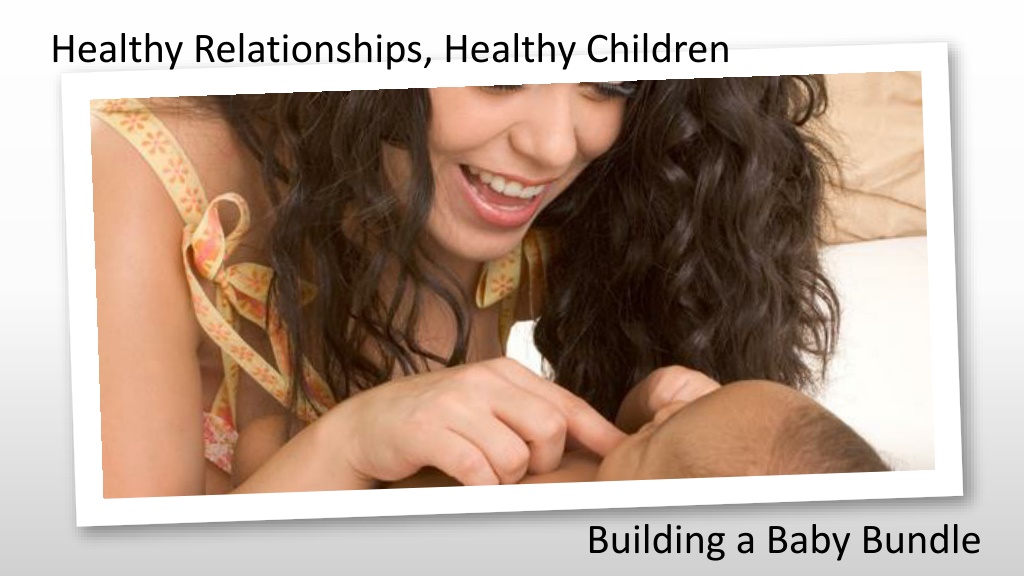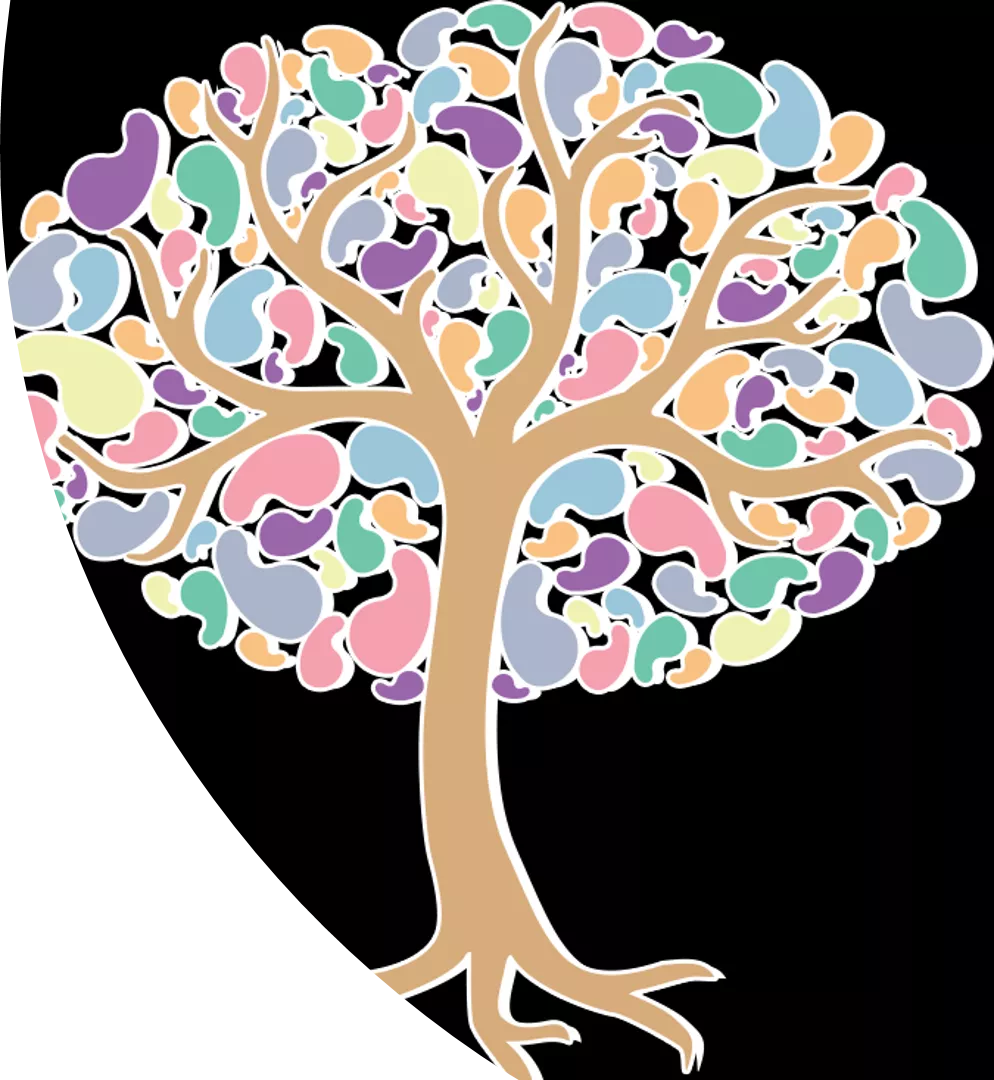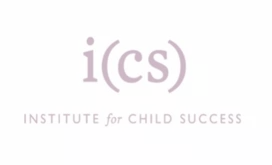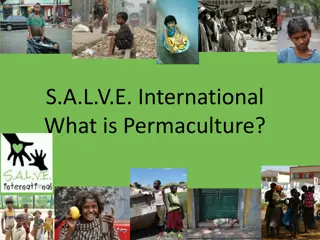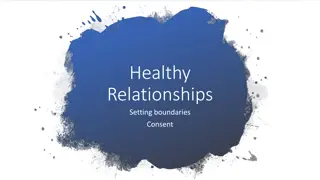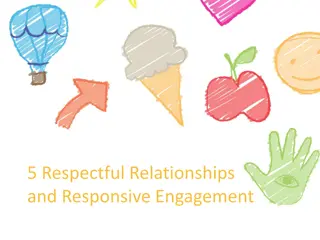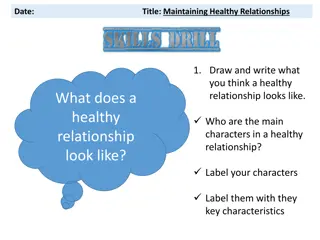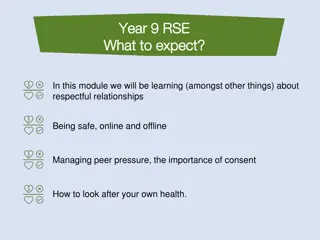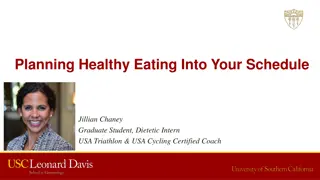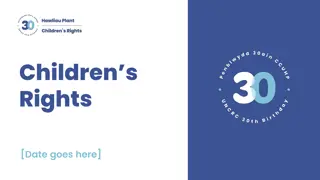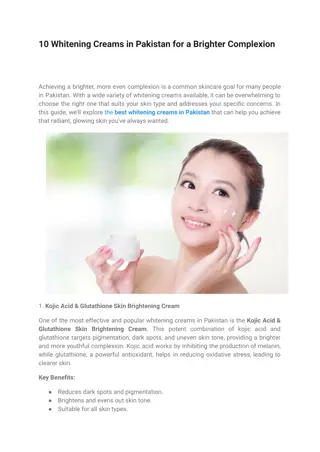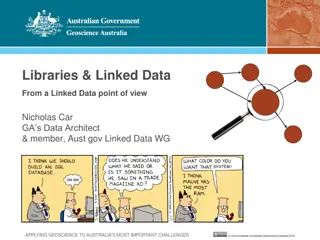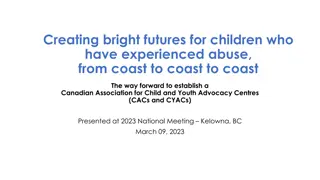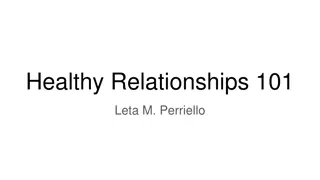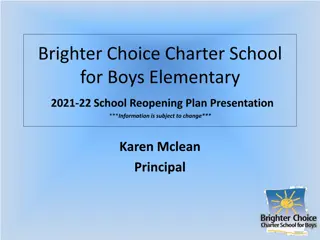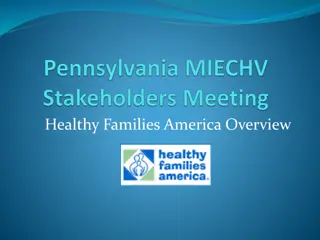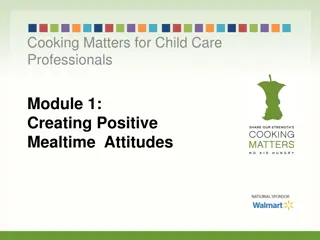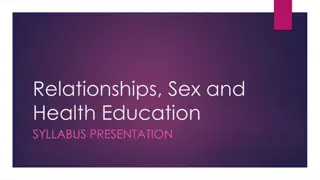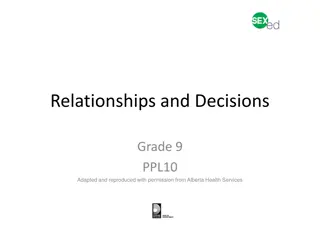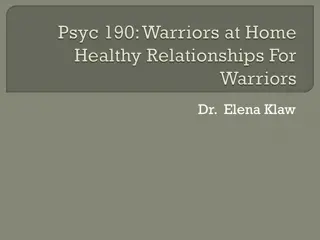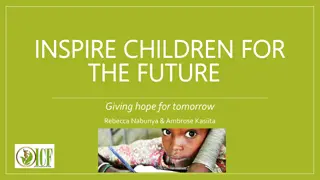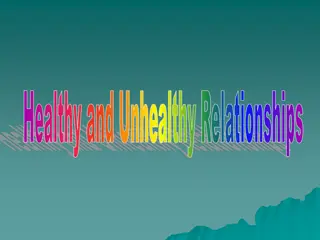Building Healthy Relationships and Children for a Brighter Future
Exploring the importance of healthy relationships in building a strong foundation for children, this content delves into the challenges families face and the need for supportive environments to foster children's well-being. Through workshops and discussions on adverse childhood experiences, the focus is on understanding the impact of stress on child development and the role of nurturing environments in mitigating toxic stress. By addressing key concepts such as maternal depression, domestic violence, and parental mental health, the aim is to create a roadmap towards healthier families and communities.
Download Presentation

Please find below an Image/Link to download the presentation.
The content on the website is provided AS IS for your information and personal use only. It may not be sold, licensed, or shared on other websites without obtaining consent from the author. Download presentation by click this link. If you encounter any issues during the download, it is possible that the publisher has removed the file from their server.
E N D
Presentation Transcript
Healthy Relationships, Healthy Children Building a Baby Bundle
Healthy Relationships, Healthy Relationships, Healthy Children: Healthy Children: Building a Baby Bundle Building a Baby Bundle Champions for Young Children Workshop August 3, 2018 Janice Gruendel, Ph.D., M.Ed. Senior Fellow, Institute for Child Success janice.gruendel@aya.yale.edu
Our work for today Setting the SC context Remembering the neuroscience What s in your backpack? Building a Baby Bundle Why we do this work
# 38 Part I Setting the SC Context
A FEW FAST FACTS 41% of all children live in single parent families 55% of children under age six live in low-income families (200% of FPL or less) 22% of South Carolina adults have reported two or more ACEs 22% (or more) young children have experienced at least three risk factors The bottom line: We have some more work to do
Part II Remembering the neuroscience
All families face some adversities, and some families face more Maternal depression Parent-child attachment Domestic violence Substance Abuse ACES Parental Health & Mental Health Unstable/unsafe housing Family and community violence Developmental delays Health problems Social-emotional issues Anxiety/fear/aggression Program absences School suspensions/ expulsions School performance Not enough food to get through the month Unstable child care Weak social networks & social capital Unstable work status Needs of aging parents Child Health, MH and Behavior Family Basic Family Basic Needs Needs 7 Adapted from ACF: 10.14.17
When Stress Becomes Toxic Getting immunized; Meeting new people; First day at school. First day at work. Presenting big ideas at a public meeting; Performance evaluation NORMAL NORMAL STRESS STRESS Toxic Stress Derails Healthy Development Serious Illness; Death of a loved one; Frightening accident; Acrimonious divorce; Persistent discrimination TOLERABLE TOLERABLE STRESS STRESS Key Concepts: Toxic Stress. Harvard Center on the Developing Child, Retrieved July 2015 Tolerable stress that is NOT adults (or peers). The body s stress system activates and stays at high levels like revving a car s engine for hours every day. NOT buffered by caring, actively-present TOXIC TOXIC STRESS STRESS This causes damage at the cellular level of our bodies, impacts our health and mental health, and can be passed from one generation to the next at the genomic level. 8
Remember, adversity in the lives of young children can have dramatic consequences that can last a lifetime Trauma Toxic Stress Adverse Childhood Experiences Mindfulness Mindfulness Health Hope Healing Resilience Resilience Poverty Racism & Implicit Bias Inequity and Instability Politics WE CAN BUILD IT The early years really matter The early years really matter Intertwined cognitive and social- emotional development Executive function Self regulation Empathy The Arc of Science: Gruendel 12.5.17 9
Parents and Babies: Moms matter and dads matter, too CLICK NOW CLICK NOW The Still Face Experiments 10
Part III What s in Your Backpack?
Remembering the ACES story CLICK NOW CLICK NOW 12
HANDOUT ACES Yes or No. Count up the total 1. Did a parent or other adult in the household often swear at you, insult you, put you down or humiliate you, or act in a way that made you afraid that might be physically hurt? 2. Did a parent or other adult in the household often push, grab, slap or throw something at you, or ever hit you so hard that had marks or were injured? 3. Did an adult or person at least 5 years old than you ever touch or fondle you or have you touch their body in a sexual way, or try to actually have oral, anal or vaginal sex with you? 4. Did you often feel that no one in your family loved you or thought you were important or special, or your family didn t look out for each other, feel close to each other, or support each other? 5. Did you oftenfeel that you didn t have enough to eat, had to wear dirty clothes, and had no one to protect you, or your parents were too drunk or high to take of you or take you to the doctor if you needed it. 6. Were your parents ever separated or divorced? 7. Was your mother or stepmother often pushed, grabbed, slapped or had something thrown at her, or Sometimes or often kicked, bitten, hit with a fist, or hit with something hard, or Ever repeatedly hit over at least a few minutes or threatened with a gun? 8. Did you live with anyone who was a problem drinker or alcoholic or who used street drugs? 9. Was a household member depressed or mentally ill or did a household member attempt suicide? 10. Did a household member go to prison?
RESILIENCE Questionnaire Yes Maybe No HANDOUT 1. I believe that my mother loved me when I was little. 2. I believe that my father loved me when I was little. 3. When I was little, other people helped my mother and father take care of me; they seemed to love me. 4. I ve heard that when I was an infant someone in my family enjoyed playing with me, and I enjoyed it, too. 5. When I was a child, there were relatives in my family who made me feel better if I was sad or worried. 6. When I was a child, neighbors or my friends parents seemed to like me. 7. When I was a child, teachers, coaches, youth leaders or ministers were there to help me. 8. Someone in my family cared about how I was doing in school. 9. My family, neighbors and friends talked often about making our lives better. 10. We had rules in our house and were expected to keep them. 11. When I felt really bad, I could almost always find someone I trusted to talk to. 12. As a youth, people noticed that I was capable and could get things done. 13. I was independent and a go-getter. 14. I believed that life is what you make it.
About Me HANDOUT My Aces Score My Resilience Score My current challenges My strengths and supports today My school climate My classroom climate
HANDOUT About the kids my classroom Early Trauma Early Resilience What do I know? Current Challenges What can I know? Current Strengths How can I know it? My classroom learning climate My classroom behavior climate
Part IV Building a Baby Bundle So, what about the babies?
A Case Example: Bridgeport, Connecticut City population: Nearly 146,000 Annual Births: About 1800 99.9% Free and Reduced Lunch Bridgeport is surrounded by the wealthiest cities/towns in the state and the nation, and has the largest achievement/opportunity gaps in America.
A Case Example: Spartanburg, South Carolina City population: Just over 37,000 Children under 5: About 1350 Children to age 28 in poverty: 26%
The Bridgeport Story 14% of 8th graders proficient in math 30% of 3rd graders reading at level 30% of entering K school ready 75% of three-year olds enter Head Start BEHIND 15% no or inadequate prenatal care 2/3rds of the city s 1800-2000 births are Medicaid funded In Bridgeport s collective impact effort, we started with the data
Our BHAG: Born Healthy and Ready at 3 All Bridgeport babies born beginning in January 2018 will reach expected health and developmental benchmarks by the age of three.
The science says: To raise kids who are healthy and ready at 3 we need to build relational health by investing in Strong & Healthy Families RESILIENCE Strong & Healthy Schools & Communities Healthy Babies and Toddlers
Real Real- -time Data time Data on Clients & on Clients & Outcomes Outcomes An Organizational Reality Check: Do we have a 21st century management and operational system at the city and state level? Resource Resource Flexibility & Flexibility & Innovation Innovation CQI and CQI and Accountability Accountability Strategic Planning, Strategic Planning, Policy & Policy & Communication Communication Internal & Cross Internal & Cross- - Agency Workforce Agency Workforce Support & Support & Development Development Strategic Strategic Partnerships Partnerships
The Bridgeport Baby Bundle Design Bridgeport Baby Investment Bundle Track Change. Measure Impact Supported Care and Parenting An Army of Helpers and Advocates Innovation and Better Connections
A Peek at Whats Inside Each Strategy Blue Blue & bold=action & bold=action Track Change. Measure Impact Supported Care and Parenting An Army of Helpers and Advocates The Baby Investment Bundle Innovation and Better Connections Authentic Family & Neighborhood Engagement Elders Rock the Babies Top to Bottom (linking food & diapers) Respectful service access: No wrong door and a warm handoff National Interoperability Collaborative Bpt Virtual Baby Data Coalition: DSS, OEC & SDE Partnership City DPH and hospital data Medicaid admin data The Bridgeport Basics Pre- and perinatal universal home visiting Universal screening Early literacy Infant and toddler family child care Maternal wellness (including MH) Resilience screenings The Bridgeport Baby Squad Building champions: Faith, pediatric, higher education and giving Sectors Strategy #1 PLUS Strategy #5: Innovative Funding re Data; High wealth donor Baby Scholarships; State Medicaid re-form funding
A Deeper Dive on Strategy #1 Supported Care and Parenting Innovation and Better Connections The Bridgeport Basics Pre- and perinatal universal home visiting Universal screening Early literacy Infant and toddler family child care Maternal wellness (including MH) Maternal wellness (including MH): Expand ACES and maternal depression screening and the MOMs Partnership The Bridgeport Basics: Customized free website with videos and other materials Pre- and perinatal universal home visiting: Expand Family Connects Universal screening: New APP for parents (Sparkler with Ages and Stages), Expand pediatric developmental screening and data sharing Early literacy: Expanding Reach Out and Read, and linking with Read to Grow Infant and toddler family child care: All Our Kin
A Sample of a Deeper Dive on Strategy #1 1. Supported Care and Parenting: Cross-Strategy Linkages Innovation and Better Connections 2. An Army of Helpers and Advocates Community hosted Resilience screenings The Bridgeport Basics Pre- and perinatal universal home visiting Universal screening Early literacy Infant and toddler family child care Maternal wellness (including MH) 3. Baby Investment Bundle Sponsors being sought for ongoing Basics website costs and new pediatric channel (below) 4. Innovation and Better Connections Basics videos on new pediatric office TV channel and in social services offices and well-child clinics
A picture containing indoor, person, screenshot Description generated with very high confidence CLICK CLICK
Hello Family: The Spartanburg Bundle Hello Family seeks to improve outcomes for Spartanburg s young children prenatally through age five (and their families) through a Pay for Success social financing strategy.
The Spartanburg Pay for Success Story A Pay for Success project drives better outcomes by paying for positive, measurable outcomes once they are achieved as opposed to paying for services upfront regardless of outcomes achieved. Some people also call this Pay for Performance. ICS, May 2, 2018
HELLO FAMILY PROGRAM Revised: May 2, 2018 IMPACTS BIRTH 6 MONTHS 6 MONTHS 5 YEARS BIRTH 6 MONTHS PRENATAL - BIRTH Triple P BirthMatters Quality Counts Family Connects REDUCED: Provider Service Child medical costs Universal postnatal nurse home visiting Early Learning Quality Improvement Doula support for low-income mothers Universal parenting and family support Parent medical costs Child Protective Services costs Service Population Approximate Mental health costs Spartanburg, SC Substance abuse 820 350 1,500 2,100 Criminal behavior Remedial education costs IMPROVED: REDUCE: Emergency medical utilization, ER and inpatient. REDUCE: Low-weight births Preterm births Caesarean birth rate NICU admissions REDUCE: Foster care placements Child maltreatment REDUCE: Teacher turnover Potential Outcome Child and adolescent behavior Metrics Cognitive development Educational outcomes INCREASE: Kindergarten Readiness Classroom quality Teacher qualifications and retention INCREASE: Breastfeeding at birth Healthy birth spacing INCREASE: Access to high quality childcare INCREASE: Tentative: Family Protective Factors Labor market outcomes
WHEW This is a lot of stuff to think about
But now that we know Health, hope, kindness and resilience are ours to build, together for our children and ourselves
